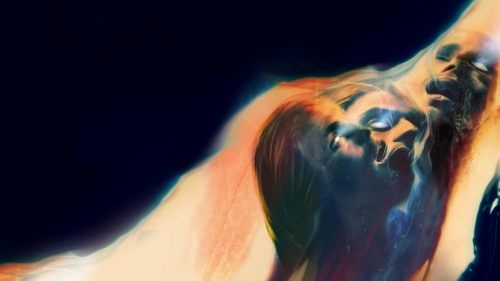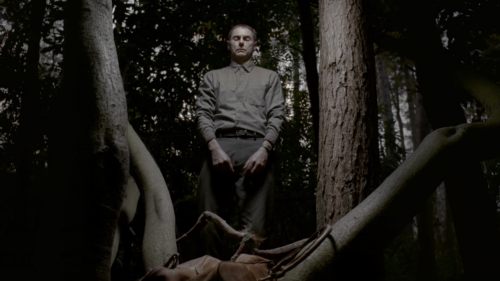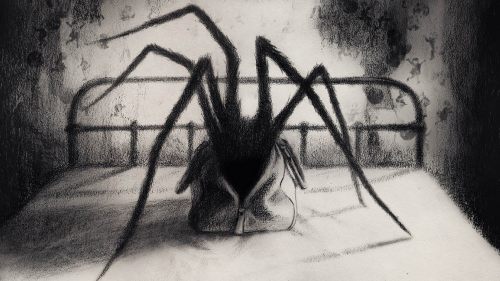Brooklyn Horror Fest Review: POSSUM Plays Dead Serious
“I know writers who use subtext, and they're all cowards.”
That’s a great line from a great show: Garth Marenghi’s Darkplace, a British TV show that ran for a single season and may just be one of the best and cleverest comedies (let alone horror-comedies) in history. It’s uttered by Marenghi himself, a fictional horror writer who deals in extremely on-the-nose, extremely terrible stories. The man does not like subtext - although, when you look at the show, his work is absolutely, unintentionally laden with it. Marenghi was created and played by Matthew Holness, and lately, Holness has embarked on a directing career of his own. He entered the feature realm this year with Possum, which played recently at the Brooklyn Horror Film Festival, and its approach to subtext is fascinating.
Based on Holness' own short story, Possum is a horror movie about trauma that both uses its genre conceits as metaphor, and in a more blatant manner of which Garth Marenghi would be proud. Sean Harris (Mission: Impossible's Solomon Lane) stars, and appears in nearly every single scene, as Philip, a disgraced former puppeteer who carries around a duffel bag containing Possum: a spectacularly creepy spider puppet, often accompanied by ominous black balloons. The film follows Philip’s attempts to rid himself of Possum - inevitably, standing in for his childhood trauma - and gets more distressing from there.
Philip’s trials as a social outcast and traumatised human being are caused and accompanied by frequent nods back to his past. Whispers circulate about terrible incidents from decades prior, and a subplot about a missing schoolboy plays ambiguously, with the ominous implication that Philip may have meted his own trauma out upon others. Philip’s also obsessed with a nursery rhyme and horrifying, Babadook-esque handmade children’s book about Possum - something about which he’s constantly mocked by venomous stepdad figure Maurice (prolific character actor Alun Armstrong). Possum's influence constantly pushes Philip backwards toward childhood, and though the people who attack him as a "pervert "aren’t exactly right, they’re not entirely wrong either: Philip’s psychology is so regressed, he can’t help but be drawn back towards school. He even calls teachers “sir.” Yes sir, sorry sir. It's a recurring nightmare come to life.
A dread-filled psychological horror movie might not seem like a natural fit for Holness, best-known for his comedy work, but Possum yet delivers a startlingly complete vision. The looping, repetitive storyline mostly serves as a structure from which to hang despair, and boy does it. Holness’ spare, Pinteresque dialogue creates immense aural voids that fill up with loneliness, often plummeting into the realm of surrealism. Though it’s not exactly set in the English countryside, it shares DNA with Britain’s rural horror tradition, placing Philip in marshes, moors, and forests that feel starkly isolating even in the empty light of day.
Here’s something funny about mental illness: when you have it, every movie you see becomes a story about it. I’ll frequently proclaim certain movies are about depression, when other people might have vastly different takes. These films tend to crop up a lot in the genre world, largely thanks to genre films’ propensity to be designed, or interpreted, as metaphor. Possum is one of these films.
Philip’s trauma and depression is at the core of Possum, and every department helps to evoke it. Cinematographer Kit Fraser, who shot the similarly unsettling Under the Shadow, frequently wreathes Philip in darkness, making the most of Harris’ pale, gaunt face. Philip and Maurice’s flat - and Possum’s - is dirty, nicotine-stained, and falling apart, situating the figures in an uncomfortably intimate, almost biological setting. Oppressive soundscapes (courtesy of the legendary Radiophonic Workshop) and sickeningly unpredictable editing help create the uneasy feeling that something’s always lurking just around the corner. The quiet panic doesn’t subside until after you’ve left the building.
As one might expect, Harris plays a significant part in Possum’s success. Though his face often fills the frame, twisted into looks of dread or abject terror, his unique performance is exceptionally physical. Constantly leaning forward, hands held defensively in front of him, his feet struggling to keep up with his forward momentum as he walks, he truly evokes the image of a frightened, lost schoolboy grown to adult size. His Philip is a mumbling, glum loser - but those qualities weren’t born, but made.
So is this subtext, or is it text? Yes, Possum is a metaphor for Philip’s childhood trauma - but Philip also literally carries him around with him, just as those who’ve been traumatised do. Philip spends the entirety of the movie trying to dispose of that trauma - whether by burning Possum, throwing him in a marsh, or through other means - but his puppet (or is it the puppeteer?) always comes back. It’s a little on the nose, sure - but god damn, that puppet is terrifying. That Possum doesn’t just return to Philip’s house, but his room and sometimes even his bed, speaks to the way that sometimes, our mental health issues can burrow so deep, they become familiar and comfortable.
While Possum’s resolution is a little disappointing - rendering text a plot development that could easily have been left ambiguous - it does little to dampen or dismantle the dread that’s come before it. In this debut feature, Holness has delivered a singularly clear and horrifying vision - a simple but overwhelmingly frightening horror story, wrapped in atmosphere so thick you could drown in it. Garth Marenghi wishes he could write something so upsetting.



